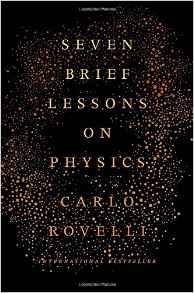 Carlo Rovelli, Seven Brief Lessons on Physics (New York: Riverhead Books, 2016), 86pp.
Carlo Rovelli, Seven Brief Lessons on Physics (New York: Riverhead Books, 2016), 86pp.
This little book, says Carlo Rovelli, "is written for those who know little or nothing about modern science." That would be me. Even though I still didn't understand lots of this book, I was very glad I read it. Rovelli writes with awe and humility at the majesty and mystery of our cosmos. The seven little "chapters," each of which is about eight pages, originally appeared as a series in the Italian newspaper Il Sole 24 Ore.
Rovelli begins with Einstein's three famous papers in 1905, which after further work became known as the General Theory of Relativity in 1915. In its "breathtaking simplicity," Einstein's work on space, time, and gravity remains "unequaled." Chapter two considers the "second pillar" of modern physics, quantum mechanics, which although it has been experimentally verified, remains "shrouded in mystery and incomprehensibility" a century after its discovery. Chapter three considers the unimaginable scale and scope of our macro-cosmos, and chapter four our micro-cosmos of electrons, quarks, photons, and gluons (the Standard Model of particle theory).
But then a paradox — the twin pillars of general relativity and quantum mechanics "cannot both be right, at least in their current forms, because they contradict each other." Chapter five considers the efforts to solve this mystery. After a chapter on the heat of black holes, a final chapter considers our own human selves. Who are we? What are we? What is our place in the cosmos? What is consciousness or free will? "If we are special," write Rovelli, "we are only special in the way that everyone feels themselves to be, like every mother is for her child. Certainly not for the rest of nature."
I don't begrudge Rovelli this materialist conclusion. Left to itself, and to its self-imposed narrow methodology, it's all that science can (or even should) say. But science isn't the only way to know, or the only thing worth knowing. Matters of meaning, value, and beauty, for example, lie outside its scope. So, even though it's only half a loaf, I was still grateful for this little gem of a book.


